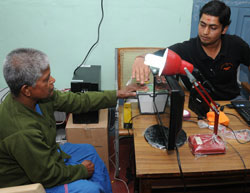
New Delhi, April 30: In order to weed out the problem of fake PAN cards and to ensure an accurate biometric data, the government has initiated a mammoth project to bring together both the Aadhar and the PAN databases.
The Nandan Nilekani-led Unique Identification Authority of India (UIDAI) issues the Aadhar number which is now being synchronised with the Permanent Account Number database maintained by the I-T Department.
The Finance Ministry, which had first mooted the proposal of generating and issuing biometric PAN in 2006, had kept the decision pending for sometime as it was felt that both the agencies (UIDAI and I-T) would be "duplicating the effort" to reach a common goal -- biometrics-based identity.
"It has been decided to integrate both the Aadhar and the PAN database which will help the agencies to maintain a correct database for ensuring two things.
"While the Aadhar will ensure effective disbursal of government schemes to citizens, the biometric PAN card database will help stop the forgery of PAN cards which begets economic crimes," a senior Finance Ministry official said.
The Finance Ministry, under the then Finance Minister P Chidambaram in 2006, had proposed that the biometric PAN cards would have the I-T assesses' fingerprints (two from each hand) and the face.
This will now be achieved by collating the Aadhar database with that of the PAN.
The entire effort to have a biometric PAN card was to avoid duplication and stop fraudulent practices by tax evaders and anti-nationals and now with the delivery of the UID number it has achieved the same purpose, the official added.
The I-T department, in a number of cases, has uncovered several individuals possessing multiple PAN cards or forging the details to evade taxes and create 'benami' properties.
According to a latest data of the I-T department (till November, 2011), a total of 13,74,03,213 PANs are valid at present.
The PAN card-Aadhar card, according to the official, is being developed as a "national identifier" document by the government.
It is being integrated with other official databases for ensuring implementation of schemes and creating an effective enforcement tool against financial offences like tax evasion and money laundering.
While PAN is a 10-digit alphanumeric number allotted by the I-T department to taxpayers, biometrics is a biological method to identify physical features of an individual.
A 2010-11 CAG report on direct taxes had earlier revealed that 958 lakh (95.8 million) PANs were issued up to March 2010 but I-T returns filed in the corresponding period were only 340.9 lakh (34.09 million).
"The CAG had said that the gap between PAN holders and the number of returns filed was 617.1 lakh (61.7 million) but once the biometrics is available we will be able to weed out possibly all such fake PANs," the official said.





Comments
Add new comment